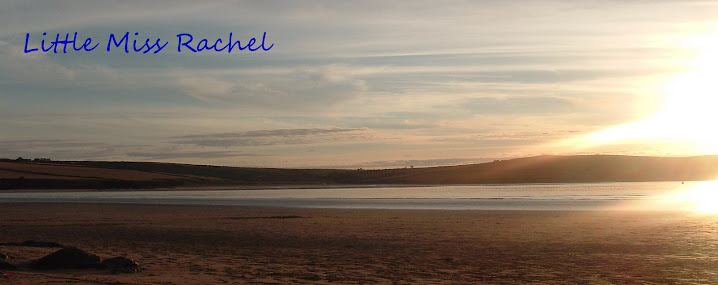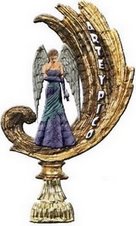Warning - this contains plot spoilers (but I am assuming that most people who wish to have read the book have done so by now).
It was rather fitting that it was in the seventh month of 2007 that the seventh Harry Potter book was published. Throughout the series seven has been an important number; “Isn't seven the most powerfully magical number?” -- Tom Marvolo Riddle to Horace Slughorn (HBP). From the word go things have occurred in seven: Harry is born in the seventh month and indeed the prophecy involves the two born in the seventh month. There are seven Weasleys, seven Quidditch players to a team and 700 ways of committing a foul. There are seven years, seven floors and seven secret tunnels at Hogwarts, witches and wizards come of age at 17. To reach the philosopher’s stone there are seven challenges; there are seven registered animagi and the Triwizard Cup started 700 hundred years ago. The trunk in which Moody is imprisoned in the Goblet of Fire has seven key holes and Dobby has seven socks. It is clause seven of the decree which allows magic to be used before muggles in exceptional circumstances and of course it is seven which appeals to Voldemort and he divides his soul into seven pieces creating seven horcruxes.*
And then, in the opening sequences of the Deathly Hallows, polyjuice potion is used to form seven Harrys to fly to seven locations to try and force Voldemort off the trail when the charm surrounding 4 Privet Drive breaks on Harry’s seventeenth birthday or when he ceases to call the place home. At once the characters are older, stronger and even at this early stage ready to lay down their lives in the struggle against evil. That Hedwig dies at this point can be no coincidence. J K Rowling hinted that Hedwig was Harry’s link to his childhood; from the point of Hedwig’s death this is no childhood story and these are not childhood issues.
The Deathly Hallows does not, as all the other books have done, start with the usual return to Hogwarts after a long summer holiday. There is no return to school for our trio; both Hogwarts and the Ministry have been invaded and turned by Voldemort. Harry Hermione and Ron spend the vast proportion of the book on a journey around the country, sleeping in tents and struggling with both the challenge left to them by Dumbledore to find and destroy the remaining horcruxes and with their feelings of helplessness, inadequacy and fear. Rowling draws many analogies here from other epic tales, not least from Lord of the Rings as disaster threatens to loom. There are desertions and near deaths; there are false trails and help from unexpected quarters. Many loose ends are tied up and the eventually the importance of the Deathly Hallows is revealed before the book and the series ends in the climatic Battle of Hogwarts.
The Battle of Hogwarts joins together the three main themes of the entire series: love death and destiny. We discover that Dumbledore was doomed to die and had ordered Snape to kill him to spare Draco. That Snape all along had been acting as a triple agent, loyal to Dumbledore to the very end and able to die an honourable death, his motivations ultimately driven by unrequited love for the same person whose love had saved Harry from Voldemort at the very beginning of his life and sealed his destiny. In that knowledge Harry was able to accept that Voldemort could not be killed while he still lived and was able to choose to come back, to master the Elder Wand and eventually to destroy Voldemort. But Harry did not act alone; although a crucial role he could not have fought the entire battle alone. Without the courageous actions of the order of the phoenix and Dumbledore’s Army there would almost certainly have been far more casualties. Voldemort’s ultimate downfall was that he had never known love and could not, did not, understand it; he had been born the product of merely a love potion and abandoned when it wore off. It was love which saved Harry just as it was love that killed Voldemort.
Just as Harry looked into the Mirror of Erised perhaps the appeal of the series lies surely in the reflection of our world within the magical world. Just as we struggle with adolescence, of love, loss hope and death, so do the magical characters only in their world love eventually triumphs over evil. The final Chapter may have been a cliché but at the same time pleasing to find out that some things do work out as they ought. The Deathly Hallows is a fitting end to the series.
*This piece was written very quickly and I failed to notice my error for which I apologise. Voldermort deliberately divided his soul in seven but of course to create horcruxes he needed to retain one piece of his soul within his own body. Therefore there were six intentional horcruxes and the unintentional seventh in Harry.
Thursday, August 02, 2007
Book Review: Harry Potter and the Deathly Hallows
Labels:
Book Review,
Harry Potter
Subscribe to:
Post Comments (Atom)
.jpg)



13 comments:
Voldemort creates six Horcruxes- the seventh (Harry) was created unintentionally and he keeps one remaining part of his soul inside his body.
I don't agree with your comment that 'even at this early stage ready to lay down their lives in the struggle against evil'- this is what they've done throughout the entire series!
He created seven - six in inanimate objects keeping the seventh part of his soul within himself. The eighth part which attachs to Harry when his mother is killed was unintentional but Voldermort deliberately chose to divide his soul into seven.
They have certainly been struggling with evil all series but I felt that it was at the point of the polyjuice potion that Harry realises that they are all prepared to give their lives if necessary. Some characters have displayed some indication of this trait earlier in the series but not to this degree.
No- a Horcrux describes the receptacle in which part of a wizard's soul is stored so that if the body gets destroyed the(dark) wizard can live.
He did deliberately choose to split his soul in seven. I agree that there were only six intentional horcruxes but my point was relating to the importance of the number seven.
That's what I said in my first comment! Well then why did you say that Voldemort 'split his soul into seven pieces creating seven Horcruxes'? I thought saying what you mean when stating a fact would be elementary to someone who wants to be a writer.
To be honest the whole paragraph about the significance of the number seven sounds like it's been plagiarised from Wiki- I hope not.
Thank you for pointing out my errors.
Obviously there is a finite list of examples of the number seven and I do not find it surprising that the two lines regarding the number seven on wikipedia has similarities with mine.
Laura
Thanks for the Harry-talk! I just posted my own reveiw…I’d love to hear what others think!
http://catherinemcniel.blogspot.com/2007/08/my-final-post-about-harry.html
Thanks for the link to my post, Rachel!
I was struck in this book by the amount of suffering going on offstage. While Hermione is in hiding, other Muggle-borns are being rounded up for detention; while Harry and Ron are in hiding, everyone else at Hogwarts is fighting what is probably a much harder battle. Even though Harry takes the starring role at the end, Rowling is careful to show that Neville, Ginny et al are fighting their own battles.
It's very clever, really - the dark shadows are long in this book, but Rowling is able to avoid depicting the worst suffering directly. It's still a book that's mostly safe for children to read, while hinting at much worse tortures at the fringes of the text.
(And Anonymous needs to relax a little bit, IMHO.)
I got more hits for 'harry Potter 7' than any other blog entry ever.
I did enjoy it, it was a little holiday into a magical land
ln9DVo You have a talant! Write more!
Good for people to know.
Post a Comment